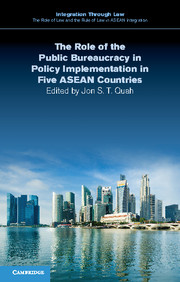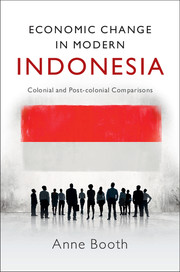1714 results in South-East Asian government, politics and policy
Contents
-
- Book:
- Islamic Populism in Indonesia and the Middle East
- Published online:
- 05 December 2015
- Print publication:
- 05 February 2016, pp vii-viii
-
- Chapter
- Export citation

The Role of the Public Bureaucracy in Policy Implementation in Five ASEAN Countries
-
- Published online:
- 05 February 2016
- Print publication:
- 12 February 2016
Bibliography
-
- Book:
- Islamic Populism in Indonesia and the Middle East
- Published online:
- 05 December 2015
- Print publication:
- 05 February 2016, pp 190-214
-
- Chapter
- Export citation
7 - Navigating through democracy
-
- Book:
- Islamic Populism in Indonesia and the Middle East
- Published online:
- 05 December 2015
- Print publication:
- 05 February 2016, pp 137-158
-
- Chapter
- Export citation
Copyright page
-
- Book:
- Islamic Populism in Indonesia and the Middle East
- Published online:
- 05 December 2015
- Print publication:
- 05 February 2016, pp iv-iv
-
- Chapter
- Export citation
5 - Pathways of political failure
-
- Book:
- Islamic Populism in Indonesia and the Middle East
- Published online:
- 05 December 2015
- Print publication:
- 05 February 2016, pp 97-115
-
- Chapter
- Export citation

Economic Change in Modern Indonesia
- Colonial and Post-colonial Comparisons
-
- Published online:
- 05 February 2016
- Print publication:
- 11 February 2016
8 - Navigating through neoliberalism
-
- Book:
- Islamic Populism in Indonesia and the Middle East
- Published online:
- 05 December 2015
- Print publication:
- 05 February 2016, pp 159-183
-
- Chapter
- Export citation
3 - The genesis of Islamic populism
-
- Book:
- Islamic Populism in Indonesia and the Middle East
- Published online:
- 05 December 2015
- Print publication:
- 05 February 2016, pp 48-74
-
- Chapter
- Export citation
Acknowledgements
-
- Book:
- Islamic Populism in Indonesia and the Middle East
- Published online:
- 05 December 2015
- Print publication:
- 05 February 2016, pp ix-x
-
- Chapter
- Export citation
1 - Introduction
-
- Book:
- Islamic Populism in Indonesia and the Middle East
- Published online:
- 05 December 2015
- Print publication:
- 05 February 2016, pp 1-19
-
- Chapter
- Export citation
Index
-
- Book:
- Islamic Populism in Indonesia and the Middle East
- Published online:
- 05 December 2015
- Print publication:
- 05 February 2016, pp 215-228
-
- Chapter
- Export citation
6 - A study in political marginality
-
- Book:
- Islamic Populism in Indonesia and the Middle East
- Published online:
- 05 December 2015
- Print publication:
- 05 February 2016, pp 116-136
-
- Chapter
- Export citation
9 - Conclusion
-
- Book:
- Islamic Populism in Indonesia and the Middle East
- Published online:
- 05 December 2015
- Print publication:
- 05 February 2016, pp 184-189
-
- Chapter
- Export citation
Dedication
-
- Book:
- Islamic Populism in Indonesia and the Middle East
- Published online:
- 05 December 2015
- Print publication:
- 05 February 2016, pp v-vi
-
- Chapter
- Export citation
4 - Modernisation and the Cold War
-
- Book:
- Islamic Populism in Indonesia and the Middle East
- Published online:
- 05 December 2015
- Print publication:
- 05 February 2016, pp 75-96
-
- Chapter
- Export citation
Making Sense of the Election Results in Myanmar's Rakhine and Shan States
-
-
- Book:
- Making Sense of the Election Results in Myanmar's Rakhine and Shan States
- Published by:
- ISEAS–Yusof Ishak Institute
- Published online:
- 09 March 2019
- Print publication:
- 04 February 2016, pp vii-viii
-
- Chapter
- Export citation
Foreword
-
- Book:
- Making Sense of the Election Results in Myanmar's Rakhine and Shan States
- Published by:
- ISEAS–Yusof Ishak Institute
- Published online:
- 09 March 2019
- Print publication:
- 04 February 2016, pp v-vi
-
- Chapter
- Export citation
Frontmatter
-
- Book:
- Making Sense of the Election Results in Myanmar's Rakhine and Shan States
- Published by:
- ISEAS–Yusof Ishak Institute
- Published online:
- 09 March 2019
- Print publication:
- 04 February 2016, pp i-iv
-
- Chapter
- Export citation
Making Sense of the Election Results in Myanmar's Rakhine and Shan States
-
-
- Book:
- Making Sense of the Election Results in Myanmar's Rakhine and Shan States
- Published by:
- ISEAS–Yusof Ishak Institute
- Published online:
- 09 March 2019
- Print publication:
- 04 February 2016, pp 1-28
-
- Chapter
- Export citation

